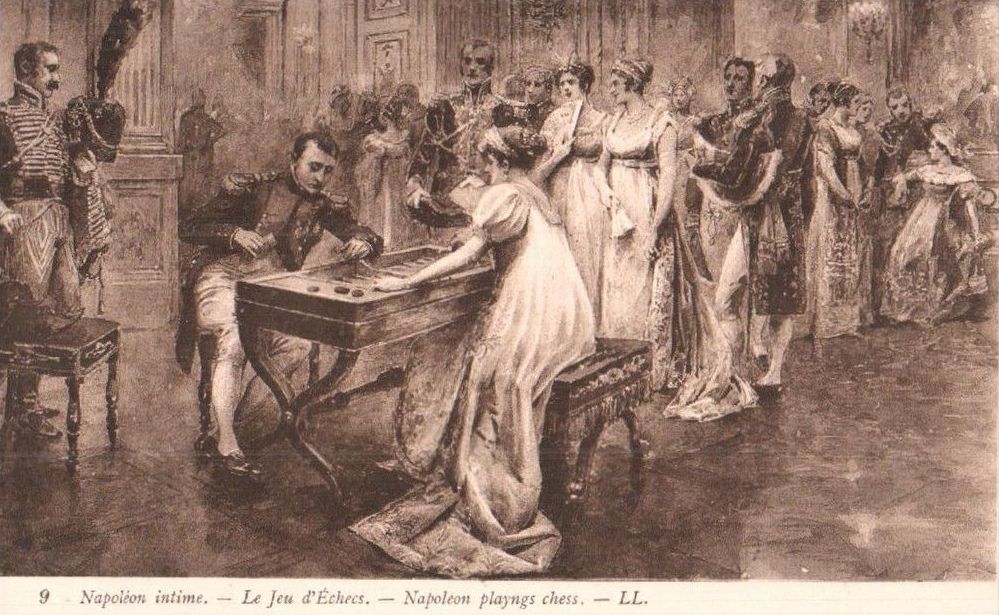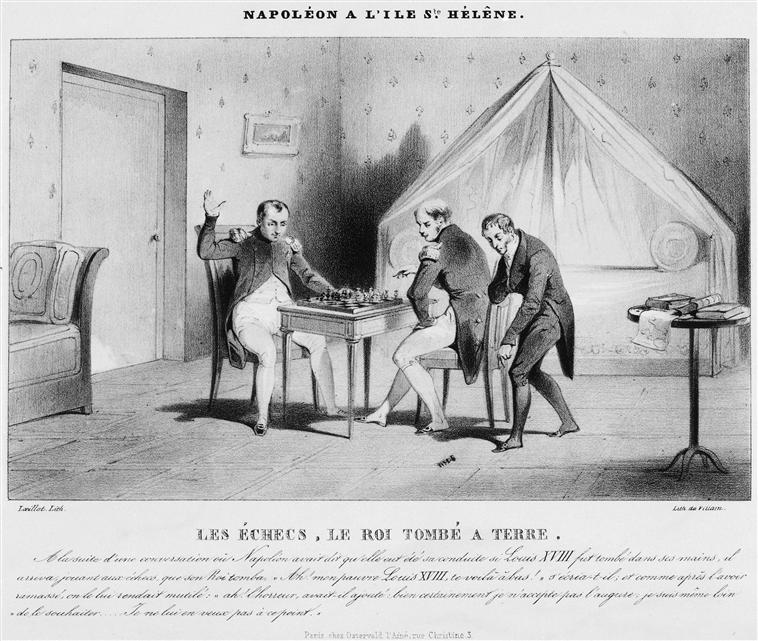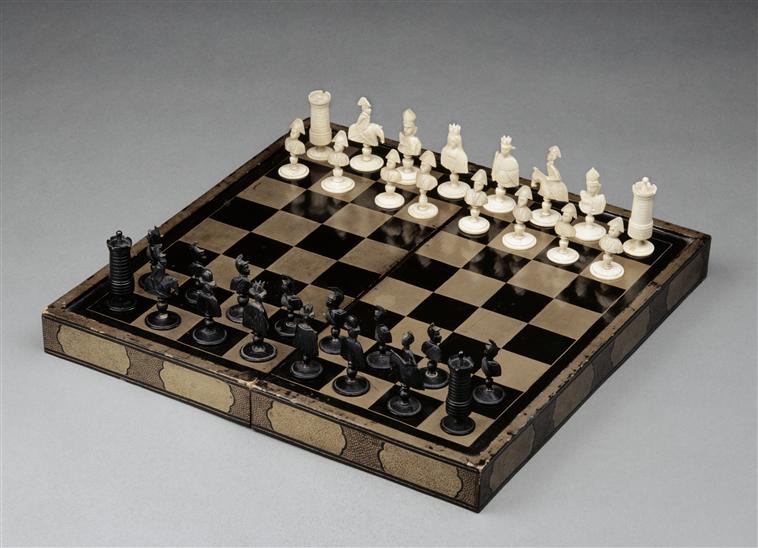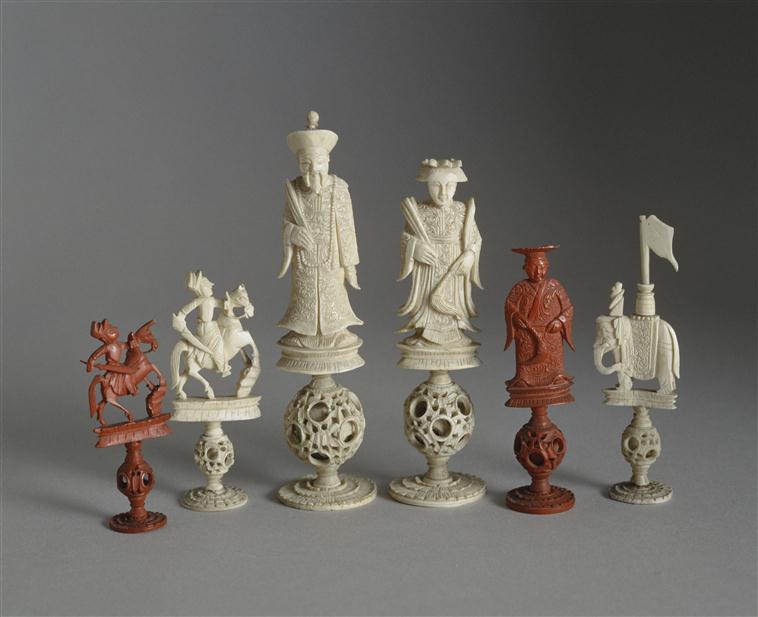A strategic game par excellence, an elegant symbol of the art of war, chess has been the king of games and the game of kings since the Middle Ages. Napoleon Bonaparte could not remain indifferent to it without, however, and it is surprising, never becoming a brilliant player!
Napoleon, a Bad Sport
If Napoleon Bonaparte often arouses blissful enthusiasm or blind hatred, no one seems to question his strategic genius. Of course, such a talent would seem to find in the peaceful and regular practice of the game of chess the exaltation of this remarkable strategic mind. However, it is not. Napoleon certainly learned the rules of chess when he was a pupil at Brienne; this game was indeed one of the many qualities that good society deemed necessary for a young man. While settling in Paris, the “petit lieutenant” comes to practice “pushing wood” at the Café de la Rotonde or at the very popular Café de la Régence, haunt of the best chess players since the middle of the Eighteenth century.
The revolutionary period, tasting little of the central role accorded to the King’s play, had kept chess in the shade for a few years, reworking its form without changing its substance so that the game espoused the republican cause. But the craze – never extinguished – for the traditional form soon returned and Napoleon was not indifferent to it. Until the young lieutenant had yet dazzled France with the meteoric Italian campaign, no one pay interest to its play on the chessboard. Nonetheless, had he shown the extent of his military genius on Italian soil, it was imagined that he was just as formidable leaning on a gaming table. He was not.
First, let us note that the conception of chess at the turn of the 18th century was very different from today. The strategic theory and the preparation of the attacks were almost nil and the direction of positioning hardly considered. One wanted to shine on the chessboard with the same brilliance as the final assault of a Homeric battle. The games were aggressive and the attacks started quickly without hesitating to sacrifice pieces and pawns for a spectacular checkmate. Nevertheless, circles of amateurs and champions gradually took shape, treaties multiplied and strategy developed. François-André Danican Philidor, nicknamed “the Great” (1726 – 1795), undoubtedly the best player of his time, was also the first to shake up the intuitive and imaginative vision of chess by writing one of the very first treatises on the game.
Probably Napoleon’s way of playing was borrowed from the old and the new manner. But where the future First Consul shone and knew how to use his talent, he lost his advantage on the chessboard. Indeed, on each side of the board, the opponents face the same field and are in possession of the same squad information. In this case, it was impossible for Bonaparte to take advantage of the natural terrain, impossible to bluff on the number of soldiers per contingent. On the chessboard, the two opponents are on equal ground; the strategy and the inventiveness to be deployed are not the same as in real war. Journalist and writer Jean-Claude Kauffmann sums up the game attributed to Napoleon:
The strategist of Austerlitz and Friedland who considered the battlefield a chessboard was a poor chess player. He naively rushed at the opponent and was easily captured, which did not prevent him from brazenly cheating.
Bonaparte was cheating. It’s a well-known fact and not just in chess! We know his impatient and sometimes (often?) difficult character, it is quite easy to imagine him as a bad player. Perhaps he would have been better – at chess anyway – if he had had the opportunity to study the game better. This great reader might not have had the opportunity to look at the treatises newly published. All his life he loved this game without being a top player.
In Egypt, he played with the Comptroller of Army Expenses Jean-Baptiste-Etienne Poussielgue (1764 – 1845) and with Amédée Jaubert (1779 – 1847), member of the Commission for Science and the Arts and translator. In Poland, it was with Murat (1767 – 1815), Bourrienne (1769 – 1834), Berthier (1753 – 1815) or the Duke of Bassano (1763 – 1839) that he played chess. Like a close friend, Bourrienne testifies with sincerity to Bonaparte’s game while Hugues-Bernard Maret, Duke of Bassano goes there with a touch of flattery:
Bonaparte also played chess, but very rarely, and this because he was only a third force and he did not like to be beaten at this game. He liked to play with me because, although a little stronger than him, I was not strong enough to win him always. As soon as a game was his he would quit the game to rest on his laurels.
Louis Antoine Fauvelet de Bourrienne, Mémoires
The Emperor did not skillfully start a game of chess. From the start, he often lost pieces and pawns, disadvantages his opponents dared not take advantage of. It wasn’t until the middle of the game that the right inspiration came. The melee of the pieces illuminated his intelligence, he saw beyond three to four moves and implemented beautiful and learned combinations.
Hugues-Bernard Maret, Duke of Bassano
Probably the Duke will have seen the Emperor’s game on a good day … Unless he was dazzled by the pomp more than the game! Because Napoleon Bonaparte was not the type, one would have suspected, to easily accept defeat. In addition, he was impatient, stamped his foot or drummed on the table when he judged his opponent too slow, which did not fail to disturb the arrangement of the pieces on the board … Whether his opponent was human or mechanical, his attitude was the same. A certainty acquired during this famous episode that we never tire of telling.
In July 1809 at Schönbrün Palace in Vienna, a historic chess game was about to take place. Setting up the chessboard and one of the two opponents is laborious; and for good reason: it is about installing an automaton. Imagined and manufactured by Baron Wolfgang von Kempelen (1734 – 1804), this mechanical “Turk” has already played games with some of the world’s greats, including Catherine the Great (1729 – 1796) or even Benjamin Franklin (1706 – 1790) while the automaton was at the Café de la Régence in Paris in 1783.
In 1809 however, the learned machine no longer belonged to the baron but to Johann Nepomuk Mälzel (1772 – 1838) but still aroused enthusiasm (as well as suspicion, a very natural feeling which would later be legitimized). Napoleon Bonaparte accepts the confrontation with the automaton. The game was chaotic because the automaton seemed perfectly capable of recognizing a cheater when it saw one! So the Turk would put a pawn or a piece in its place as soon as his opponent tried to cheat. A nasty twist that Bonaparte had no qualms about facing the machine. But, the annoyed automaton systematically swept the chessboard with his arm after three fraudulent attempts which, of course, did not fail to happen with the Emperor. The Mechanical Turk thus defeated Napoleon I by disqualification.
In 1834, the deception was exposed. The automaton was endowed with no mechanical intelligence. A set of mirrors and articulated arms allowed a small player to crawl under the automaton and the board and play brilliantly against all the prestigious opponents he faced. Either way, it must nevertheless be recognized that this (or these?) player, as anonymous as he was, was one of the best chess players of the time!
Napoleon at Saint Helena
In 1815, Napoleon Bonaparte was exiled to Saint Helena, an island as remote from Europe as the temper of the fallen Emperor. Bonaparte’s unrestrained and permanent activity contrasted with the imperturbability of this isolated rock, one may almost believe that by dint of work Napoleon would be able to make it move. Obviously, one tried to recreate a refined environment, however, the Empereur never fear the Spartan life. Days were often studious but almost every day Napoleon loved to play chess. The 19th-century grandiloquence of the gaming journal, La Palamède, reflects Napoleon’s still strong taste for the chessboard:
If the game of chess had not already attained a high nobility, it would be ennobled by giving a few moments of happy entertainment to the greatest of prisoners and exiles.
La Palamède, 1836
A poetic assertion quickly disheartened by Las Cases :
He was infinitely weak at chess.
It’s a safe bet that Napoleon did not win many games! Especially since Madame de Montholon, who attended many parties during the exile, added that:
Touch-move rule, but it was only for his opponent. For him [Napoleon] it was different and he always had a good reason why it didn’t matter, if anyone notices it, he would laugh.
At least the island air seemed to have softened his bad sport character (in chess at least)!
Upon his hasty departure from France, we know that a chess board was carried in the luggage. Nevertheless, Napoleon Bonaparte had at his disposal during his stay at least two Chinese chessboards, one of which was offered to him by… an Englishman.
On July 4, 1817, boxes from China destined for Bonaparte arrived at Saint Helena. In one, a beautiful chessboard and its ivory and cinnabar pieces was the gift to the Emperor from John Elphinstone. The man was then head of the Canton counter for the East India Company and with this elegant gift expressed his gratitude to Napoleon. The latter had indeed saved the life of Lord Elphinstone’s brother during the Belgian campaign in 1815 by demanding that this Scottish aristocrat seriously injured and taken prisoner be treated. The zealous gratitude expressed by the Lord pushed the detail so far as to stamp all the pieces of the game with the imperial monogram. A detail which flattered the emperor but which annoyed even more (because he was always on edge) his jailer Hudson Lowe who accepted reluctantly and after several days, to transmit his present to the illustrious French prisoner.
This gesture of Lord Elphinstone impressed Napoleon more than the game itself, the pieces of which were impressive. The tower in particular was a huge elephant which aroused Bonaparte’s amusement: « I should need a crane to move this tower! » (La Palamède, 1839).
Some pieces of the various chess games he owned were distributed to his companions in exile during the New Year’s Eve. It seems that Marshal Bertrand received a few in January 1817 without it being possible to say with certainty which game it was. Today a set and a few pieces are kept in French museums and in private hands, and sometimes pieces resurface from the past at auctions. Very tenuous memories of the life, character and faults of Napoleon Bonaparte, a fine strategist on the ground but an inveterate cheater on the chessboard!
Marielle Brie de Lagerac
Marielle Brie est historienne de l’art pour le marché de l’art et de l’antiquité et auteur du blog « Objets d’Art & d'Histoire ».




